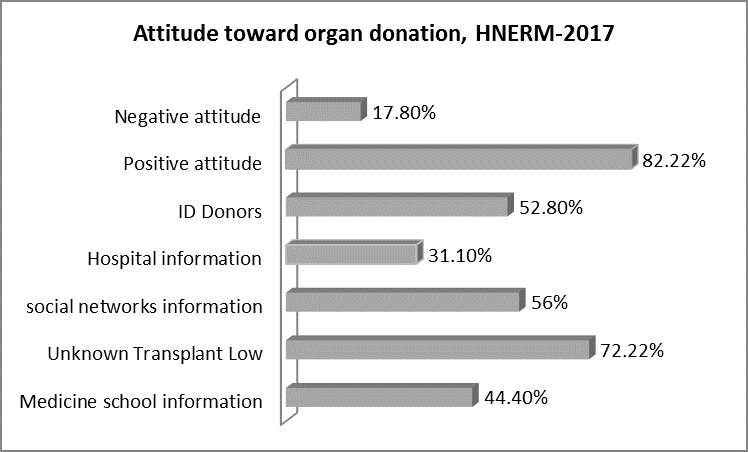Knowledge and Attitude Towards Organ Donation among Medical Residents. Lima-Peru
Martin Gomez1, Evelyn Castañeda1, Cesar Cruzalegui1, Giannina Bazan1, Augusto Nakachi1, Heinrich Soto1, Ester Sifuentes1, Carmen Berrios1, Jaqueline Apaza1.
1Nephrology Department, Hospital Rebagliati, Lima, Peru
Introduction: Health care professionals are the most critical link in the organ procurement process and therefore, their knowledge and attitudes are essential factors in the creation and promotion of an environment that has a positive influence on organ donation rates. Objective: To assess the knowledge and attitude towards organ donation among medical residents.
Material and Methods: A cross sectional study was conducted among medical residents (n=180) at a public tertiary care hospital, Lima-Peru. The survey contents consisted of the organ´s general characteristics, education status, religion, general information about donation and trasplantation and the attitude toward the donation and trasplantation. The survey was validated (Spearman=0.67, α Combach=0.812). Used SATA 12, level of significance was 5%.
Results: The mean age were 29.2 years ± 4.2. More than half of the respondents had the correct knowledge about organ donation (58%). Nearly half of the respondents have an ID Donation (52.8%) very willing to donation (82.2%), refuse to donate (17.8%) are not willing to donate due to religious and cultural reasons, similar to latinoamerican studies. More than 80% of the study participants in our study accepted that they would donate their organs, similar to mexican and colombian studies, but different some spanish and german studies . They found information in medical school (44.4%) and hospital information (31.1%), others sources of information such as social networks and internet (56%), in our country this the first study that evaluated this tecnological aspects in this population. There are relationship among clinical and surgery residents and knowledge about organ donation and procedence (p<0.05). No statistically significant differences were found among years of residents, gender and cultural aspects.

Conclusion:The present study demonstrated favorable attitude among medical residents towards organ donation despite their limitations/gaps in knowledge about the same. Need to implemented courses and workshops about on organ donation and transplantation in the medical residents curriculum in order to improve knowledge of medical students.
